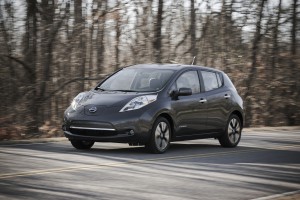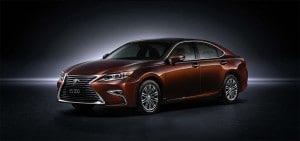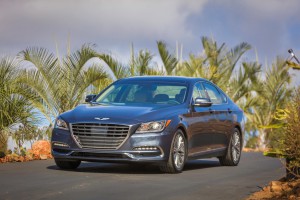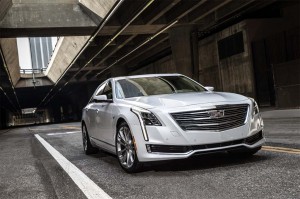Korean upstart Genesis has scored another surprise, this time landing in the number one spot on the annual J.D. Power Vehicle Dependability Study the first year for which it was eligible.
In another surprise, the Nissan Leaf brushed aside traditional reliability kings like the Toyota Corolla and Honda Civic to be named the most dependable model in the VDS compact car category. This marks the first time a battery-electric vehicle has ever won – though industry experts say that this could become the norm going forward for vehicles with fewer moving parts and the need for far less routine maintenance.
On the whole, the new study – which this time focuses on products from the 2017 model-year – found an average 1.5% improvement in vehicle dependability. That said, Power’s automotive research chief David Sargent cautioned that, “The rapid introduction of technology is putting increased pressure on dependability, so it would not be surprising to see problem levels plateau, or even increase, over the next few years.”
Genesis has already scored repeat wins in the J.D. Power Initial Quality Survey which looks at the number of “problems” owners report with vehicles during their first 90 days on the road. However, this is the first year for which Genesis models are qualified for inclusion in the VDS since it is just three years since the luxury brand was spun off by mainstream Korean carmaker Hyundai.
(Koreans dominate latest JD Power Initial Quality Study. Click Here for the full story.)

Sales of the Nissan Leaf have slipped as more competition has entered the market, but owners remain pleased with the car’s high dependability.
It was an ostentatious debut, Genesis owners reporting an average 89 problems for every 100 vehicles included in the survey, or less than one issue for every car. Second-place Lexus, the traditional benchmark brand in the VDS, slipped into second with 100 problems or, in Power-speak, 100 PP100. Buick was not only the third-ranked brand, with 103 PP100, but by far and away the top-performing Detroit marque.
The rest of the top 10, in order, consisted of Porsche, Toyota, Volkswagen, Lincoln, BMW, Chevrolet and Ford. Significantly, that meant that there were more domestic brands — ranked in that group than Japanese, with just two. Considering the Japanese have traditional been the overwhelmingly dominant players when it comes to longer-term reliability that could be seen as a significant setback.
It wasn’t a disaster for the Asian makers, however, All three South Korean brands – Genesis, Hyundai and Kia, came in above industry average. And Toyota took top honors in six of 20 individual segments with models including the Lexus ES, Lexus GX, Toyota 4Runner, Toyota Avalon, Toyota Sienna and Toyota Tundra. The Lexus ES, in fact, had the best score ever recorded in the 31-year history of the Vehicle Dependability, just 52 problems reported for every 100 vehicles.
General Motors wasn’t far behind, with five segment awards: for the Buick Encore and Buick Regal, and for the Chevrolet Equinox, Chevrolet Silverado HD and Chevrolet Tahoe. The Cadillac brand, 12th overall, was the most-improved among 32 brands covered by the 2020 VDS, with 35 fewer problems per 100 vehicles compared with last year’s VDS.
(Quality isn’t everything for owners, new Power study finds.)

The Sixth-generation Lexus set an all-time record for the lowest number of problems ever recorded by the VDS.
More than 36,000 U.S. owners of 2017 model-year vehicles were surveyed for the study which asked about 177 possible problems grouped into eight major vehicle categories. The results showed some of the biggest improvements came in the category covering navigation, infotainment and other technologies like Bluetooth phone connections.
But, while “We’re seeing improvement,” said Sargent, “automakers still have a long way to go to before they can declare victory in this area.” These were common sources of complaint when the 2017 models were new, “and, three years later, (owners are) still frustrated with them,” Sargent said.
If anything, the addition of still more new technologies, especially advanced driver assistance systems like lane-keeping assist and forward collision warning with emergency auto braking, have been generating a new wave of complaints that have shown up in the Initial Quality Survey and will likely reappear when the vehicles are old enough to be counted in future dependability studies, Sargent warned.
He also noted that utility vehicles continued to be the source of more complaints than sedans and other passenger cars – though the gap has been narrowing.
Another trend to watch will be the growing availability of battery-electric vehicles. When the Nissan Leaf debuted a decade ago it was the only mainstream BEV on the market. Today, there are more than a half dozen long-range electric vehicles alone, a figure that is expected to reach as much as 200 by the later this decade, according to industry researchers.
The Nissan Leaf, in 2017 wrapping up its first generation, made an auspicious farewell from a quality perspective by topping the Chevrolet Cruze and Toyota Corolla, the second and third-ranked models in the Compact Car category.
How Tesla products might have ranked is unknown because the automaker doesn’t cooperate with Power researchers. But industry analysts are betting that, with fewer moving parts and the need for less routine maintenance, owners could see the dependability of BEVs surge in the years ahead – as long as they don’t experience serious problems with their complex onboard electronics.
(Japanese brands losing their grip on vehicle reliability. Click Here for more.)


